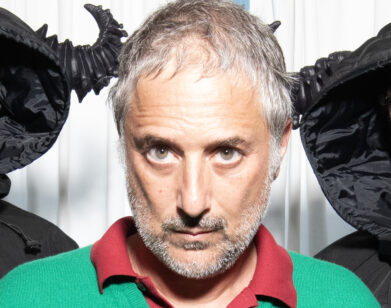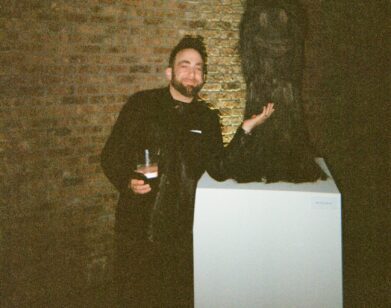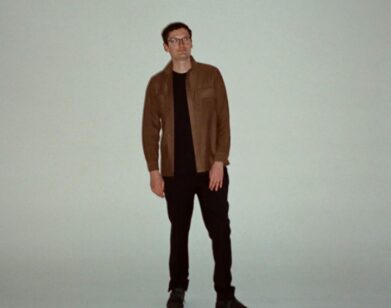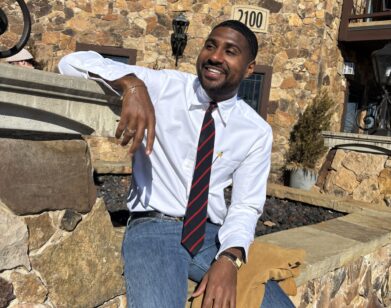Thomas Sadoski: The News from the Newsroom
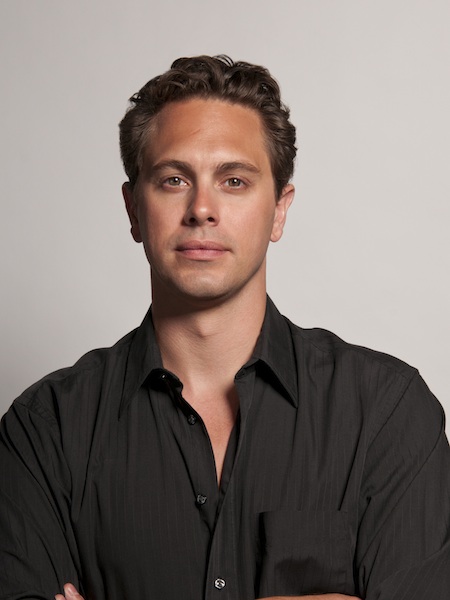
While he is currently most famous for his role as the hot-tempered, ratings-chasing executive producer, Don Keefer, on HBO’s The Newsroom, Thomas Sadoski is also a theater veteran. Sadowski’s role in Neil LaBute’s reasons to be pretty (2009) earned him a Tony nomination, and last year the actor starred alongside Stockard Channing and Rachel Griffiths in Joe Mantello’s production of Other Desert Cities. He’s is an economical addition to The Newsroom cast; creator Aaron Sorkin found Sadoski so compelling that he combined two characters into one for Sadowski to play.
As Don Keefer, the highly adept, albeit emotionally negligent, former executive producer of News Night, Sadoski finds his character the cuckold to Jim and Maggie’s unconsummated affair and relegated to the soft-news fringe. He is the underdog to Jeff Daniels‘ Will McAvoy, who heralds a Don Quixote-like narrative among cabal of professionals.
While we wait for the season finale of the The Newsroom to air this Sunday, Sadoski enlightens Interview to the difference between closing the curtain and calling “cut,” the inevitable quagmire of critical reception, and transnational emigration.
AMANDA DUBERMAN: I was surprised to find out that your background is primarily in theater.
THOMAS SADOSKI: I’ve been working consistently for about 15 years, bouncing around the theater community, doing the odd film or television work here and there. I’m a theater guy at heart, I love the theater. I was lucky enough to spend a good decade and a half in the New York theater community.
DUBERMAN: How were you cast as Don in The Newsroom?
SADOSKI: Alison Pill and I, who plays Maggie in the show, were in a play together on Broadway. It was the second show we had done together. We both got the call that we were going to be asked to audition for the show, and we were incredibly excited. We actually went in and auditioned on the same day. We both ended up getting the call that we were going to do it within about a week of each other.
DUBERMAN: That’s so cool. Did you know when you were auditioning that you would be playing significant others?
SADOSKI: At first the character of Don was actually two different characters. I’m not entirely sure, but I guess Aaron decided he liked what I was doing and decided to combine the two characters.
DUBERMAN: That seems like a true testament to your talent, if you’re good enough to combine two characters!
SADOSKI: It was really nice. It’s incredibly flattering. Initially I auditioned to play the executive producer of the show, and Maggie’s boyfriend was supposed to be a different character. It ended up being the same guy. That was really incredible when we found out that was happening. It is Alison’s and my fourth time playing people who are in a dysfunctional relationship [laughs].
DUBERMAN: It seems you’re alarmingly good at it.
SADOSKI: I know! But it was so cool and so exciting to go through that whole process with Alison, who is such a dear friend of mine and someone who I really truly respect.
DUBERMAN: Is there anything that surprised you about the transition from theater to television?
SADOSKI: That’s tricky. The transition has been much easier for me because I am working with Aaron Sorkin, who is a playwright, really. He writes so theatrically for television. It was also a fairly gentle transition because I’m working with so many talented theater actors in this show.
DUBERMAN: What I would imagine is that, after reviews come out for a theater, the director can tweak bits and you can alter your performance, whereas if there are less-than-glowing reviews for a television show, you can’t really do anything once they say, “Cut!”
SADOSKI: Personally, I’ve never worked on a piece of art, whether in the theater or in television, where the critics have any sort of impact in terms of what we’re trying to do. That’s not to dismiss them, those folks have a job to do just like everybody else and they have opinions like everybody else. In terms of being a group of professional artists who have to do something—the way I try to explain it the best is that if Critic A from publication A hates our show, and Critic B from publication B loves our show, what are we supposed to do with that? We have to just respect everyone’s opinions and go on making the show we want to make. I’ve never worked on a show that was altered by critical reception. You just can’t afford to do that. So in that regard, it’s actually no different that working in theater. It’s just a lot more voices.
DUBERMAN: What do you think it is about this concept—the news and how it is made, distributed, and consumed—is so high octane and people have so many strong opinions about it?
SADOSKI: It informs so much of our lives. The media plays an essential role in our culture. It is the Fourth Estate; it’s an undeniably essential instrument in the great American experiment—in keeping our democracy functional. People have very strong opinions about what that means and how information should be disseminated to a population that requires information. Of course, you’re going to run into a great deal of opinions. I think that’s just fertile ground for us. What else would you want to write a show about than something that is that much of a pressure cooker, that has that much influence and impact? We’re going to run into a lot of different opinions, but it’s inspiring to me that newsmen and newswomen have reached out and said how thrilled they are with what we’re doing.
DUBERMAN: Are people placing too much emphasis on the subject matter, whereas you see it more as a backdrop against which to ask questions and make suggestions on ethics, relationships, moral ambiguity, etc. ? Or do you think the show has accepted the responsibility to accurately represent this very particular type of environment?
SADOSKI: I think that’s a really smart question. I think it’s primarily an interesting backdrop—a fertile backdrop, in which we can discuss a great deal involving the human condition. We’re not trying to lecture the media on how it should be doing its job or lecture people on who they should be voting for, but it does provide an incredible backdrop on which we can paint a lot of pictures and open up a lot of discussions.
DUBERMAN: In this show, the audience knows more than the characters. How does that inform your performance?
SADOSKI: It’s really exciting. In some ways, having the audience know more than the characters is precisely where you want to be in terms of drama. You can engage them much more when that is the case.
DUBERMAN: Does the cast ever anticipate which news events are going to make the cut?
SADOSKI: We don’t have a clue what is going to catch [Sorkin’s] eye in terms of how that mind of his is going to grab onto various different things and place these characters and these life stories he is telling into that context. We do sort of whisper to each other, “What do you think he’s going to do with that?” I’ve had it happen to me that people approach me on the street and say “I can’t wait to find out how The Newsroom covers X, Y, or Z story.” To me, that’s indicative that we’re doing a pretty good job.
DUBERMAN: What’s your take on the Don-Maggie-Jim love triangle? Do you think that tension will be relieved?
SADOSKI: I don’t know. I think in terms of the characters, what you’re seeing is something akin to reality. It’s really hard to know what you’re supposed to do in situations like that, when you do legitimately care for somebody, but you can’t fix them and they may not be exactly who you’re supposed to be with. Eyes wander, hearts wander, it’s just the way things go. There’s something incredibly human about the fact that it’s still not that easy to walk away from.
DUBERMAN: How do you feel about Don? Do you have anything on common with him?
SADOSKI: I do like him. I think that Don, all in all, is just a man. He has his strengths and he has his weaknesses. I certainly see faults in myself, I know that I have them. I share some of those faults with Don, but I’ve gotten to know this character since day one, page one and I think one can develop a reasonable argument for his side. Would I behave in the same way he does in certain situations? Probably not. But I understand him. One of the staples of Aaron Sorkin’s writing is these are all people who are incredibly capable with regard to what they do for a living, but they are not necessarily capable in the whole life of living— social convention certainly eludes a lot of these people.
DUBERMAN: What’s the biggest compliment someone could give you?
SADOSKI: [laughs]. Oh boy. The biggest compliment? I would say, “You helped me.” I think in terms of life, not just with acting. But certainly with storytelling, being able to hold up a mirror and allow someone to relate to a story and see something in themselves to the extent that you’re in service to another human being—I don’t know why else we’re here. To know that I helped someone would be the biggest compliment I could ever receive.
DUBERMAN: What’s next for you?
SADOSKI: There are so many things! But nothing has really landed yet. I may be doing a play out here in Los Angeles, a few movies up in the air. Really right now, what I’m doing is settling in to LA, I just moved from New York.
DUBERMAN: Deserter!
SADOSKI: Yeah. I know. Can you believe it? I had to. My wife got an amazing job out here. It was undeniable.
DUBERMAN: Alright, I guess that’s pretty unimpeachable.
SADOSKI: Thank you.
THE SEASON FINALE OF THE NEWSROOM AIRS SUNDAY, AUGUST 26 AT 10PM ON HBO.


